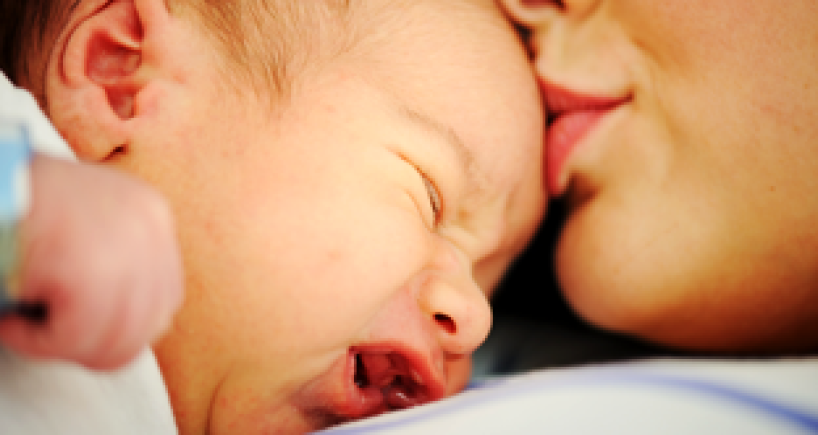
Paediatrics
Enjoy Motherhood
Dr. Vivek Jain Jul 14, 2014
 Enjoy motherhood
Giving birth is one of the most life-changing experiences you’ll ever have, but it doesn’t always go as planned,whether it is a natural or IVF pregnancy, especially when your baby is pre-mature. If you have advance warning that your baby is coming early, you may have time to prepare for the birth
Pre-term birth is the birth of a baby of less than 37 weeks gestational age (more than three weeks before the ‘due date’). The cause of pre-term birth in many situations is unknown; many factors appear to be associated with the development of pre-term birth, making the reduction of pre-term birth a challenging proposition.Pre-mature birth is defined either as pre-term birth or the birth of a baby before the developing organs are mature enough to allow normal postnatal survival. Pre-mature infants are at a greater risk for short- and long-term complications, including disabilities and impediments in growth and mental development. Significant progress has been made in the care of pre-mature infants, but not in reducing the prevalence of pre-term birth.
Classification
Depending on how early a baby is born, s/he may be:
• Late pre-term: Born between 34 and 37 weeks of pregnancy
• Very pre-term: Born at less than 32 weeks of pregnancy
• Extremely pre-term: Born at less than 25 weeks of pregnancy
Most pre-mature births occur in the late pre-term stage.
Risk Factors
Labour is a complex process involving many factors. Health conditions in the mother, such as diabetes, heart disease and kidney disease, may contribute to pre-term labour.Remember that pre-term labour can happen whether it is a natural or IVF pregnancy.
Different pregnancy-related problems increase the risk of pre-term labour or early delivery:
• A weakened cervix that begins to open (dilate) early, also called cervical incompetence
• Birth defects of the uterus
• History of pre-term delivery
• Infection (such as a urinary tract infection or infection of the amniotic membrane)
• Poor nutrition right before or during pregnancy
• Pre-eclampsia: High blood pressure and protein in the urine that develop after the 20th week of pregnancy
• Pre-mature rupture of the membranes (placenta previa)
• Age (mothers who are less than 16 or older than 35 years old)
• Lack of pre-natal care
• Use of tobacco, cocaine or amphetamines
Symptoms
A pre-mature birth means that the baby hasn’t had the usual amount of time to develop in the womb before needing to adapt to life outside the womb.
The signs that a baby’s gestation has been cut short include:
• Small size, with a disproportionately large head
• Sharper-looking, less rounded features than a full-term baby’s features
• Fine hair covering much of the body
• Low body temperature, especially immediately after birth in the delivery room
• Laboured breathing or respiratory distress
• Lack of reflexes for sucking and swallowing, leading to feeding difficulties
• Small scrotum that is smooth and has no ridges and undescended testicles (in male infants) and enlarged clitoris (in female infants)
• Soft, flexible ear cartilage
• Thin, smooth, shiny skin that is often transparent (can see veins under the skin)
Treatment
When pre-mature labour develops, the healthcare team will prepare for a high-risk birth. The mother may be moved to a medical centre that is set up to care for pre-mature infants in Neonatal Intensive Care Unit (NICU).
After birth, the baby is admitted to a high-risk nursery. The infant is placed under a warmer or in a clear, heated box called an incubator, which controls the air temperature. After the pre-mature baby is moved to the NICU, s/he may undergo a number of tests. Some are ongoing while others may be performed only if the NICU staff suspect a particular complication.
Possible tests for your pre-mature baby may include:
• Breathing and heart rate monitor: The baby’s breathing and heart rate are monitored on a continuous basis. Blood pressure readings are done frequently, too.
• Fluid input and output: The NICU team carefully tracks how much fluid the baby takes in through feeding and intravenous fluids and how much fluid s/he loses through wet or soiled diapers, blood draws and other tests.
• Blood tests: Blood samples are collected to check calcium, glucose and bilirubin levels in the baby’s blood. A blood sample may also be analysed to measure the red blood cell count and check for anemia.
• Echocardiogram: This test is an ultrasound of the heart to check for problems with the baby’s heart function.
• Ultrasound scan: Ultrasound scanning may be done to check the brain for bleeding or fluid buildup or to examine the abdominal organs for problems in the gastrointestinal tract.
• Eye examination: An ophthalmologist (eye doctor) may examine the baby’s eyes and vision to check for problems with the retina (retinopathy of prematurity).
If the baby develops any complication, more specialised testing may be needed. If a pre-mature infant’s organs are not fully developed s/he will need special care in a nursery until the organs get developed enough to keep her/him alive without medical support.
Prevention
The ways to prevent prematurity are:
• To be in good health before getting pregnant
• Get pre-natal care as early as possible in the pregnancy
• Continue to get pre-natal care until the baby is born
Getting early and good pre-natal care reduces the chance of pre-mature birth. Pre-mature labour can sometimes be treated or delayed by a medication that blocks uterine contractions.
Many times, however, attempts to delay pre-mature labour are not successful. Betamethasone (a steroid medication) given to mothers in pre-mature labour can make complications less severe.
Enjoy motherhood
Giving birth is one of the most life-changing experiences you’ll ever have, but it doesn’t always go as planned,whether it is a natural or IVF pregnancy, especially when your baby is pre-mature. If you have advance warning that your baby is coming early, you may have time to prepare for the birth
Pre-term birth is the birth of a baby of less than 37 weeks gestational age (more than three weeks before the ‘due date’). The cause of pre-term birth in many situations is unknown; many factors appear to be associated with the development of pre-term birth, making the reduction of pre-term birth a challenging proposition.Pre-mature birth is defined either as pre-term birth or the birth of a baby before the developing organs are mature enough to allow normal postnatal survival. Pre-mature infants are at a greater risk for short- and long-term complications, including disabilities and impediments in growth and mental development. Significant progress has been made in the care of pre-mature infants, but not in reducing the prevalence of pre-term birth.
Classification
Depending on how early a baby is born, s/he may be:
• Late pre-term: Born between 34 and 37 weeks of pregnancy
• Very pre-term: Born at less than 32 weeks of pregnancy
• Extremely pre-term: Born at less than 25 weeks of pregnancy
Most pre-mature births occur in the late pre-term stage.
Risk Factors
Labour is a complex process involving many factors. Health conditions in the mother, such as diabetes, heart disease and kidney disease, may contribute to pre-term labour.Remember that pre-term labour can happen whether it is a natural or IVF pregnancy.
Different pregnancy-related problems increase the risk of pre-term labour or early delivery:
• A weakened cervix that begins to open (dilate) early, also called cervical incompetence
• Birth defects of the uterus
• History of pre-term delivery
• Infection (such as a urinary tract infection or infection of the amniotic membrane)
• Poor nutrition right before or during pregnancy
• Pre-eclampsia: High blood pressure and protein in the urine that develop after the 20th week of pregnancy
• Pre-mature rupture of the membranes (placenta previa)
• Age (mothers who are less than 16 or older than 35 years old)
• Lack of pre-natal care
• Use of tobacco, cocaine or amphetamines
Symptoms
A pre-mature birth means that the baby hasn’t had the usual amount of time to develop in the womb before needing to adapt to life outside the womb.
The signs that a baby’s gestation has been cut short include:
• Small size, with a disproportionately large head
• Sharper-looking, less rounded features than a full-term baby’s features
• Fine hair covering much of the body
• Low body temperature, especially immediately after birth in the delivery room
• Laboured breathing or respiratory distress
• Lack of reflexes for sucking and swallowing, leading to feeding difficulties
• Small scrotum that is smooth and has no ridges and undescended testicles (in male infants) and enlarged clitoris (in female infants)
• Soft, flexible ear cartilage
• Thin, smooth, shiny skin that is often transparent (can see veins under the skin)
Treatment
When pre-mature labour develops, the healthcare team will prepare for a high-risk birth. The mother may be moved to a medical centre that is set up to care for pre-mature infants in Neonatal Intensive Care Unit (NICU).
After birth, the baby is admitted to a high-risk nursery. The infant is placed under a warmer or in a clear, heated box called an incubator, which controls the air temperature. After the pre-mature baby is moved to the NICU, s/he may undergo a number of tests. Some are ongoing while others may be performed only if the NICU staff suspect a particular complication.
Possible tests for your pre-mature baby may include:
• Breathing and heart rate monitor: The baby’s breathing and heart rate are monitored on a continuous basis. Blood pressure readings are done frequently, too.
• Fluid input and output: The NICU team carefully tracks how much fluid the baby takes in through feeding and intravenous fluids and how much fluid s/he loses through wet or soiled diapers, blood draws and other tests.
• Blood tests: Blood samples are collected to check calcium, glucose and bilirubin levels in the baby’s blood. A blood sample may also be analysed to measure the red blood cell count and check for anemia.
• Echocardiogram: This test is an ultrasound of the heart to check for problems with the baby’s heart function.
• Ultrasound scan: Ultrasound scanning may be done to check the brain for bleeding or fluid buildup or to examine the abdominal organs for problems in the gastrointestinal tract.
• Eye examination: An ophthalmologist (eye doctor) may examine the baby’s eyes and vision to check for problems with the retina (retinopathy of prematurity).
If the baby develops any complication, more specialised testing may be needed. If a pre-mature infant’s organs are not fully developed s/he will need special care in a nursery until the organs get developed enough to keep her/him alive without medical support.
Prevention
The ways to prevent prematurity are:
• To be in good health before getting pregnant
• Get pre-natal care as early as possible in the pregnancy
• Continue to get pre-natal care until the baby is born
Getting early and good pre-natal care reduces the chance of pre-mature birth. Pre-mature labour can sometimes be treated or delayed by a medication that blocks uterine contractions.
Many times, however, attempts to delay pre-mature labour are not successful. Betamethasone (a steroid medication) given to mothers in pre-mature labour can make complications less severe. Categories
Clear allMeet the doctor

Dr. Vivek Jain
SENIOR DIRECTOR & HOD NEONATOLOGY | Fortis Shalimar Bagh
- Paediatrics | Neonatology
-
13 Years
-
1500

















